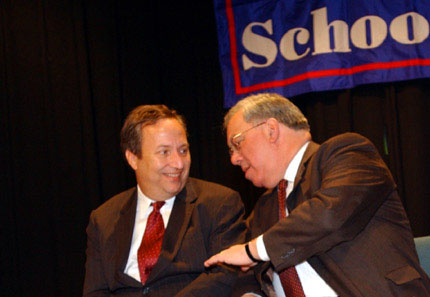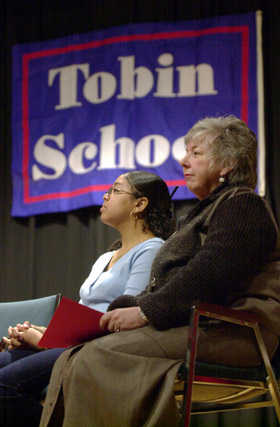Harvard After School Initiative announces $400,000 in grants


From soccer to science, civics to computers, the after-school offerings of 21 programs serving Boston youth got a $400,000 boost yesterday (Jan. 9), as Harvard formally honored its agreement to participate in Boston’s After School for All Partnership. Harvard President Lawrence H. Summers and Boston Mayor Thomas Menino were joined by politicians, educators, and students at an event celebrating the grant recipients at the Maurice J. Tobin School in Boston’s Mission Hill neighborhood.
The Harvard After School Initiative (HASI) grants, which go to programs in the city’s Allston-Brighton, Fenway, and Mission Hill neighborhoods, comprise the first installment of the University’s five-year, $5 million pledge to expand and enhance programming during out-of-school time.
“Harvard exists for only one reason, and that is that the future world depends, more than anything else, on what young people learn and go forth and do,” said Summers. “We’ve got a responsibility to the Harvard Class of 2012, and the Harvard Class of 2020… and that’s what this program is all about.”
Summers emphasized that HASI will go beyond financial grants to connect the city’s after-school programs to the University’s student, faculty, and research resources. “Harvard would not be doing what it could do and what it should do if this was just about our writing checks,” he said. “We will help with our spirit as well as with our money.”
Menino, whose inauguration speech earlier this week called for participation like this from the city’s universities and major nonprofit organizations, reiterated Summers’ commitment. “It goes a long way to giving us additional young people in our program,” he said. “We don’t want any kids left behind.”
Citing a changing society that now sees 70 percent of children coming home from school to an empty house, Menino called after-school programs “one of the most important components of what Tom Payzant is doing in the Boston Public School system. It’s reinforcing what’s going on in the classroom, and that’s so important,” he said.
Summers and Menino were joined at the podium by legislator Kevin Fitzgerald, the state representative who serves the Mission Hill neighborhood; Thomas Payzant, superintendent of the Boston Public Schools; and Tobin School principal Jean Egan.
Two grant recipients – the executive director and a student of Sociedad Latina – shared their thoughts with the audience, returning the event’s spotlight to after-school programs and the Boston youth they serve.
“At a time when young people face so many risks and after-school programming faces so many challenges to funding, I would like to thank Mayor Menino and Harvard University and President Summers for investing in our most valuable resource: Our youth, who are the future leaders of Boston,” said Alexandra Oliver-Davila, executive director of Sociedad Latina.
Sociedad Latina is using its HASI grant to start a new after-school program for middle school youth at the Tobin School. “The Mission Enrichment program is making a tremendous mark on the lives of young people,” Oliver-Davila added.
Apocalipsis Rosario, a seventh-grader at the Tobin School and participant in Sociedad Latina’s Mission Enrichment program, lauded the program and its tutors. “This program is an inspiration to me, and my personal opinion is that it should be in all Boston schools,” she said.
Sharing Harvard’s resources
Making good on Summers’ pledge to contribute more than money to Boston youth, HASI taps Harvard faculty expertise in researching, evaluating, and developing after-school programs. The Harvard Children’s Initiative (HCI), under the leadership of Judith Palfrey, and the Phillips Brooks House, directed by Judith Kidd, will focus on expanding volunteer mobilization and training of Harvard students affiliated with after-school programs. “We are facilitating the ways that students will be involved in this great undertaking,” said Kidd, citing workshops and focus groups that have already solicited student input.
The Program in After School Education and Research (PAER) is providing technical assistance and program development to strengthen the academic and other learning in after-school programs.
“What drives us in this is how to make the learning aligned with school learning while at the same time assure that it is a different form of learning, that it is fun and exploratory,” said PAER director Gil Noam, associate professor of education at the Graduate School of Education and associate professor of psychology at Harvard Medical School and McLean Hospital.
Noam is also drawing on his psychology resources at McLean to provide training workshops on mental health issues for the after-school programs HASI funds. “We’ve worked very hard … to translate the really significant knowledge we have in the Harvard teaching hospitals into a meaningful community-focused approach of positive youth development,” he said.
HASI grants at work
After formal recognition and a photo opportunity with Summers and Menino, grant recipients milled about the Tobin School auditorium swapping stories about the new initiatives the HASI grants afforded them.
Youth in Harvard’s Mission Hill After School Program, a Phillips Brooks House Association program, will get a new civics curriculum, featuring visits to local community organizations and culminating with a trip to Washington, D.C., as a result of that organization’s HASI grant.
The goal of the civics focus is “making them more aware, active citizens in their community,” said Brad Cenko ’02, an administrative director of the program. “And hopefully, long-term, inspiring them to at least think about a career in public service, because obviously that’s something that we value very highly.”
“With HASI funds we are able to increase our capacity… and improve quality by offering science, music, theater and ESL for children,” said Diane Joyce, administrative coordinator of the Jackson/Mann Community Center in Allston-Brighton. “This means that children have a safe and nurturing environment after school hours and parents have peace of mind knowing where their children are and what they are doing.”
Contact Beth Potier at beth_potier@harvard.edu




